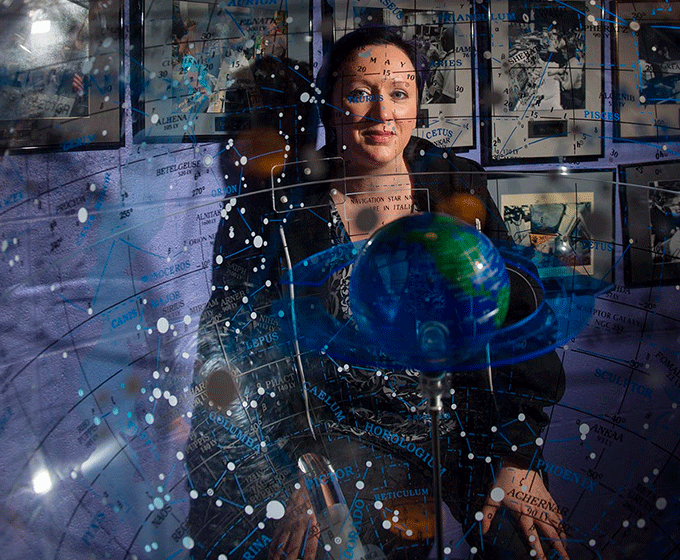
UTSA’s Angela Speck will discuss her stardust crystallization research today during the semiannual conference of the American Astronomical Society.
JUNE 13, 2022 — Angela Speck, professor and chair in the UTSA College of Sciences’ physics and astronomy department, will discuss her findings regarding stardust crystallization today during the semiannual conference of the American Astronomical Society (AAS). This year’s event, which is being held at the Pasadena Convention Center in Pasadena, California, through June 16, marks the 240th meeting of the AAS.
Entitled “Recalescence during crystallization of stardust: Resolution of the amorphous interstellar medium paradox,” Speck’s presentation examines in-depth details surrounding stardust, including its formation and crystallization.
Stardust contains a wide range of matter necessary for life including carbon, nitrogen and oxygen. When a star dies, these elements are ejected into space and serve as a “fertilizer” for forming new planets and life.
Over the past five years, Speck has been researching how cosmic gas clouds are shaped, and how stardust interacts with energy and light. For instance, a carbon dust grain could be in the form of graphite—think coal or pencil lead—and would absorb light. A diamond dust grain would let light pass through.
Understanding what stardust is made of and its crystal structure is key to unlocking fundamental answers to how stars are born and how they die, contends Speck, who also believes that stardust can reveal other important concepts in the history of the universe. This knowledge may even be applied to solving issues back on Earth.
“Dust seems insignificant, but it impacts any environment in which it exists,” Speck said. “We need to understand precise details about dust to understand its impact.”
Speck has collaborated on this project with Alan Whittington, professor in the college’s earth and planetary sciences department, and Alexander Sehlke from the NASA Ames Research Center.
UTSA Today is produced by University Communications and Marketing, the official news source of The University of Texas at San Antonio. Send your feedback to news@utsa.edu. Keep up-to-date on UTSA news by visiting UTSA Today. Connect with UTSA online at Facebook, Twitter, Youtube and Instagram.
After getting your student settled in their room, connect with other UTSA families at our Family Get Together. Attendees need to RSVP for the event.
Rock & Brews Restaurant - 5702 Landmark Pkwy, San Antonio, TX 78249Late Night at the Rec is an awesome UTSA tradition that turns a typical information session into an exciting night of fun. It's a unique opportunity to meet new people and reconnect with old friends.
Campus RecreationCheer on the UTSA Soccer team as they take on Lamar in the first home game of the season.
Park West FieldShow your UTSA pride with our spirited crew—Rowdy, Cheer, the Spirits of the Roadrunner, and the incredible Spirit of San Antonio Marching Band (SOSA)—as we light up the night in true Roadrunner style.
Main Campus East Lawn, Main CampusAnnual Giving will host a First Day of School celebration to welcome students back to campus. We will have giveaways and photo opportunities.
Sombrilla Plaza, Main CampusEnjoy snacks while connecting with Adobe reps and student ambassadors. Download or log into the Adobe Express app to snag swag and unlock exclusive back-to-school templates. It’s a fun, fast way to get creative and start the school year with bold moves.
Central Plaza, Main CampusCelebrate the merger of UTSA and UT Health San Antonio with a pop-up featuring free t-shirts, exclusive swag, and interactive photo opportunities. Open to all students, faculty and staff. Supplies are limited!
Sombrilla Plaza, Main CampusThe University of Texas at San Antonio is dedicated to the advancement of knowledge through research and discovery, teaching and learning, community engagement and public service. As an institution of access and excellence, UTSA embraces multicultural traditions and serves as a center for intellectual and creative resources as well as a catalyst for socioeconomic development and the commercialization of intellectual property - for Texas, the nation and the world.
To be a premier public research university, providing access to educational excellence and preparing citizen leaders for the global environment.
We encourage an environment of dialogue and discovery, where integrity, excellence, respect, collaboration and innovation are fostered.